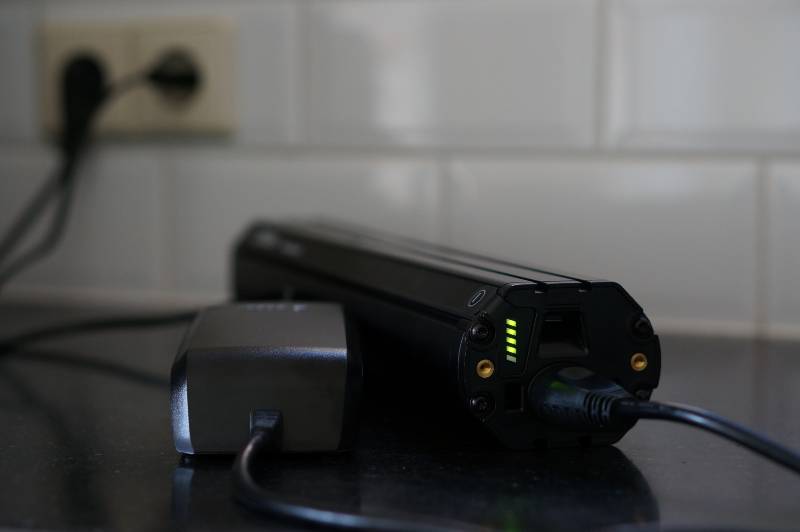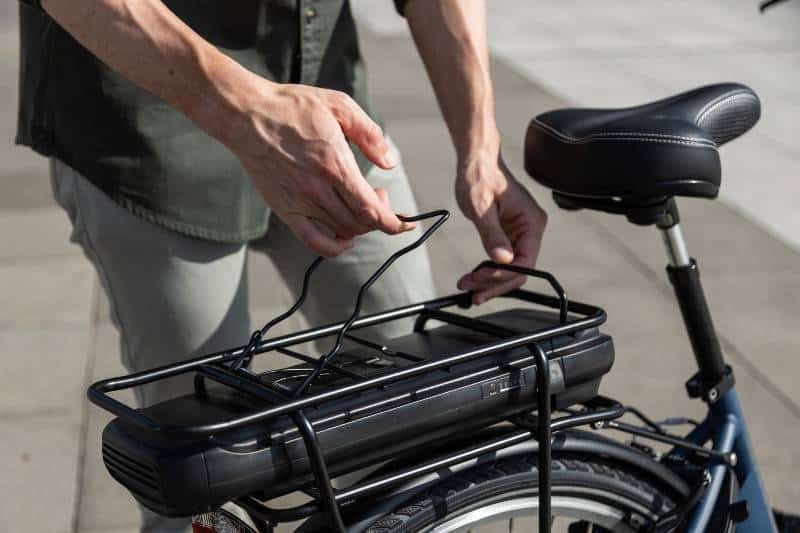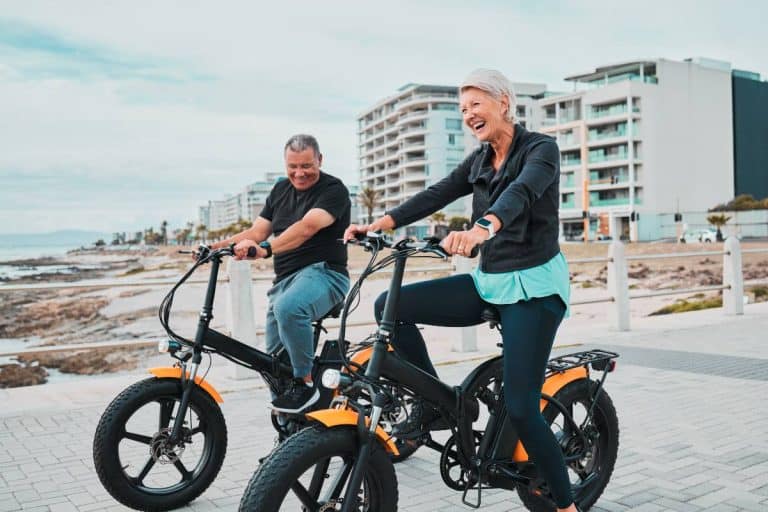How Long Do E-bike Batteries Last? [Plus Performance Tips]
Electric bike batteries are one of the most important components of your e-bike. They provide the power that makes it go! So, how long do e-bike batteries last? In this blog post, we will answer those questions and give you some tips on how to get the most out of your e-bike battery!
You should typically expect a battery to last between 3 and 5 years if it is well maintained. Most manufacturers recommend replacing batteries after two years because they may not be able to hold enough charge for long rides anymore by then.
Key Takeaways
- If properly cared for, most batteries should last between three and five years. A lithium battery will gradually lose power over time even if it isn’t utilized.
- Extreme temperatures or leaving a battery idle for an extended amount of time, on the other hand, can reduce its longevity. An E-bike battery can last for many years with regular maintenance.
- It can be challenging to determine the type of battery you need for an e-bike because they come in so many various sizes and designs. The sort of battery needed greatly depends on the size of the bike itself. Larger bikes need larger batteries, whilst smaller bikes need smaller batteries.

What is the average lifespan of an E-Bike battery?
E-bikes have become increasingly popular in recent years, as they offer a more environmentally friendly and efficient way to travel. One of the most important aspects of an E-bike is its battery, as this is what powers the motor. Therefore, it is essential to know how long the average E-bike battery will last. Most batteries should last between 3 and 5 years if they are well taken care of. Even if a lithium battery isn’t used, it will slowly lose its power over time. However, some things can shorten the lifespan of a battery, such as extreme temperatures or leave it unused for long periods. With proper care, an E-bike battery can provide years of reliable service.
How long does an E-Bike battery hold a full charge?
The lifespan of an ebike battery depends on the type of battery used.
- Lithium batteries are becoming more common and can last for up to 1,000 charge cycles.
- Nickel batteries usually last for about 500 recharge cycles.
- Lead batteries have a shorter lifespan of around 300 charge cycles.
However, the lifespan of all types of batteries can be affected by factors such as temperature and how often the battery is used.
To ensure that your battery lasts as long as possible, make sure to follow the manufacturer’s instructions carefully and to keep an eye on the “health” of your battery. If you notice any changes in performance, contact the seller as soon as possible.
How many miles do you get from a fully charged E-Bike battery?
On average, an e-bike can take you anywhere from 25 to 70 miles on a single charge. However, this number will vary depending on how you ride your bike. If you ride hard on full power, you can expect to get less mileage out of your battery. However, if you take care of your battery life and recharge it regularly, you could get more mileage out of it. Ultimately, the distance you can go on a single charge will depend on how you use your e-bike.
Ways To Prolong The Life Of Your E-Bike Battery
1. Avoid Storing Your Battery in Extreme Cold or Hot Environment
E-bike batteries are designed to last for a long time, but there are still some things you can do to prolong their life even further. One of those things is to avoid storing your battery in extremely cold or hot environments.
Both of these can put a strain on the battery and cause it to degrade faster. If you live in an area with extreme temperatures, it’s best to keep your battery in a cool, dry place indoors where it won’t be exposed to the elements.
Taking these simple steps will help ensure that your e-bike battery lasts for as long as possible.
2. Don’t Regularly Fully Discharge Your Battery
As anyone who owns an e-bike knows, the battery is essential for keeping the bike running. Without a battery, an e-bike is little more than a heavy piece of metal. However, batteries can be expensive, and they don’t last forever.
To prolong the life of your e-bike battery, it’s important to avoid regularly fully discharging your battery. When you do discharge your battery completely, it puts a strain on the battery, and it takes longer to recharge.
Additionally, it’s important to keep your battery clean and free of dirt and debris. A clean battery will last longer and perform better than a dirty one. By following these simple tips, you can help to prolong the life of your e-bike battery.
3. Don’t Submerge Your Battery in Water
As an e-bike owner knows, the battery is one of the most important components of the bike. A good battery can provide years of reliable service, but a bad one can leave you stranded on the side of the road.
One way to prolong the life of your e-bike battery is to avoid submerging it in water. Water can damage the battery cells and reduce their capacity.
If you must clean your bike in water, be sure to remove the battery and keep it dry. In addition, avoid using harsh chemicals or cleaners on your battery, as they can also cause damage.
With a little care and maintenance, you can keep your e-bike battery in good condition and extend its life.
4. Remove your E-Bike’s Battery While Transporting
E-bikes are a great way to get around, but they can be expensive. One of the best ways to prolong the life of your e-bike battery is to remove it while transporting your bike. This will help to prevent damage from jarring and vibrations, which can shorten the battery’s lifespan.
Additionally, it is important to keep your battery clean and free of debris. Dirt and grime can build up on the contacts and connections, causing electrical problems that can lead to shorter battery life. By following these simple tips, you can help to ensure that your e-bike battery lasts for many years to come.
Types of E-Bike batteries
E-bikes come in many different sizes and shapes, so it can be difficult to know what kind of battery you need. The size of the bike itself has a big impact on the type of battery required. Smaller bikes require smaller batteries, while larger bikes require larger batteries. The weight of your bike also matters, as heavier bikes require more energy to move around.
Here are some common types of e-bike batteries:
1. Lithium-ion batteries
Of the different types of batteries available on the market, lithium-ion (Li-ion) batteries are some of the most popular. That’s because Li-ion batteries offer several advantages over other battery types. For one, they tend to be much lighter in weight, making them ideal for electric bicycles, which need to be as light as possible to maximize range and efficiency. Additionally, Li-ion batteries can be molded into different shapes or fitted into unique spaces, which makes them ideal for high-capacity and low-power applications.
2. Nickel batteries
Nickel batteries are another type of battery used in e-bikes. Nickel batteries are heavier than lithium-ion batteries, but they have a higher power density, which makes them ideal for use in high-performance e-bikes. Additionally, nickel batteries have a longer lifespan than lithium-ion batteries and can be recharged many times before they need to be replaced.
3. Lead batteries
Lead batteries are the heaviest type of battery used in e-bikes. Lead batteries have a lower energy density than lithium-ion and nickel batteries, but they are less expensive and still provide good performance. Additionally, lead batteries have a shorter lifespan than lithium-ion and nickel batteries, but they can be recharged many times before they need to be replaced.
Which battery should I choose for my E-bike?
When it comes to e-bikes, lithium-ion batteries are the best option on the market. They’re lighter and more powerful than lead-acid batteries, and they don’t require as much maintenance. Although they’re more expensive upfront, they’ll save you money in the long run.
When should I replace my E-bike’s battery?
Anyone who owns an electric bike’s battery are not cheap. Replacing a battery can be almost as expensive as buying a new bike, so it’s important to do everything you can to prolong the battery’s life. With proper care and maintenance, you can expect a battery to last between three and five years.

E-bike batteries FAQS
Why charge cycles are important for e-bikes?
To maintain optimal battery charging performance, it is important to understand charge cycles and how they work. Charge cycles refer to the number of times a battery can be charged and discharged before it begins to lose its ability to hold a charge.
For most e-bike batteries, this number is between 300 and 500. After a certain number of charge cycles, the battery will begin to show signs of reduced capacity, such as shorter ride times and reduced range.
In order to prolong the life of your e-bike battery, it is important to avoid charging it to 100% every time. Instead, try to keep it between 30-80%. This will help reduce the number of overall charge cycles and keep your battery performing at its best for longer.
Should you charge your e-bike battery often?
Electric bikes are a great way to get around, but they do require some care and maintenance to keep them running smoothly. One important thing to keep in mind is that you should always charge your e-bike battery as soon as possible after it has gone flat.
We recommend charging your electric bike after each ride so that it is always ready for your next adventure. Before charging, turn off the battery. This will help prolong its life and ensure that it charges properly.
Does the e-bike charge when you pedal?
Electric bikes, or e-bikes, are a great way to get around without pedaling. But how do they work? Do you have to pedal them to charge them up?
The answer is no, you don’t have to pedal an e-bike to charge it. It’s not even very efficient to try. For every 10 kilometers you pedal, you’ll only get one kilometer of charge. It’s much better to just plug the bike into the wall when you’re not using it.
That said, some e-bike models do have a pedals-to-charge feature. However, the return on investment is so low that it’s not worth the effort. Plus, pedaling charges the battery much more slowly than simply plugging it in. So unless you’re in a pinch and need to charge your e-bike while riding, we recommend just sticking to the trusty old wall outlet!
How often do you replace e-bike batteries?
E-bike batteries are designed to last for a long time, but eventually, they will need to be replaced. Most manufacturers recommend replacing e-bike batteries every three to five years. However, this is just a general guideline – some batteries may last longer, while others may need to be replaced sooner.
The best way to determine how often to replace your e-bike battery is to consult the owner’s manual or contact the manufacturer directly. They will be able to give you specific advice based on the make and model of your bike. With proper care and maintenance, you can ensure that your e-bike battery will provide years of reliable service.
Why is my e-bike battery draining so fast?
Every e-bike has a battery management system (BMS) that is responsible for ensuring the battery doesn’t overcharge or over-discharge. The BMS will automatically cut off when the battery is full to prevent overcharging and it will also cut off when the battery is drained to protect the battery from being over-discharged.
However, sometimes the BMS can malfunction and cause the battery to drain too quickly. If you notice that your e-bike battery is draining abnormally quickly, it could be a sign that the BMS is faulty and needs to be replaced. Fortunately, it is possible to replace the BMS on most e-bike batteries, but it is a relatively complex task that should only be attempted by someone with knowledge and experience in working with electrical components.
Conclusion
Battery life is an important consideration when purchasing an e-bike. We hope this article has helped you understand how long e-bike batteries last and some performance tips to get the most out of your ride. Be sure to read more articles from our blog for helpful advice on all things eco-friendly, including electric bikes!






